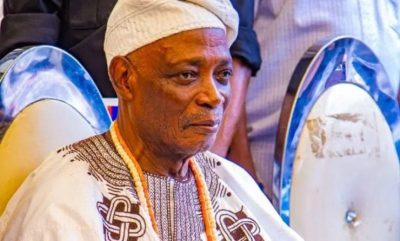Rashidi Ladoja: The man who outlived the godfathers

•From impeachment to coronation, a journey through adversity, dignity and tradition
IN a country where power is often seized, abused, or lost in silence, Senator Rashidi Adewolu Ladoja stands as a living testament to an alternative path: one paved by law, character, and the long view of history.
On Monday, as royal drummers marched to his residence, they were not just following protocol—they were affirming the closing chapter of a journey that began with political betrayal but ends with cultural vindication.
Ladoja is not just next in line to become the Olubadan of Ibadanland. He is the only man in Nigeria’s political history to go from being unlawfully removed from government house to legitimately ascending the most revered traditional throne in the West Africa’s largest city.
Back in 2003, Ladoja was elected Governor of Oyo State on the platform of the PDP. But within months, he fell out with Alhaji Lamidi Adedibu, the celebrated “Garrison Commander” of Ibadan politics. The issue? Ladoja’s refusal to hand over public funds and state appointments to political godfathers.
In January 2006, with open backing from President Olusegun Obasanjo, Ladoja was unconstitutionally impeached. Thugs celebrated, Abuja applauded—and Ibadan watched.
“They thought it was over. But Ibadan knew it was not.”
Unlike many politicians of his era, Ladoja did not retaliate violently. He went to court.
And in December 2006, the Supreme Court reinstated him, declaring the impeachment invalid. Legacy of Law and Patience, indeed.
That decision was more than a personal victory. It restored the primacy of the judiciary, protected democracy in Oyo State, and gave hope to future leaders under siege. Ladoja completed his tenure in 2007, walked away without bitterness, and returned to his roots.
Over the next 17 years, he rose steadily through the Ibadan chieftaincy ladder—a system based on service and seniority, not family name or political might.
When Governor Abiola Ajimobi attempted to disrupt that ladder in 2017 by crowning multiple high chiefs as kings, Ladoja once again stood alone, challenged the move in court, and won. He was vindicated again.
“It is not about me,” Ladoja said at the time. “It is about protecting an institution older than any of us.”
A full circle few ever see
In August 2024, he accepted the beaded crown as Otun Olubadan, fulfilling the only requirement remaining for him to ascend the throne. With the passing of the current Olubadan in July 2025, Ladoja is now set to become the 44th Olubadan.
This coronation will be far more than ceremonial. It will be the culmination of one of Nigeria’s most dramatic, instructive, and graceful political comebacks.
Ladoja’s journey is inseparable from Ibadan’s own political culture—a city where the throne is not inherited but earned. The Ibadan chieftaincy system, with its two parallel lines (civil and military), produces monarchs through patience and loyalty, not war or wealth.
Ladoja’s story proves that you can say no to political puppeteering and still survive; you can be removed by force and return by law and that you can retire from politics and still command relevance through culture.
This is not just a personal triumph. It is a moral victory for tradition over treachery.
Final word
In a time when Nigeria’s leadership space is filled with noise and power plays, Rashidi Ladoja’s life reminds us that legacy is not built on control—but on consistency.
The man who once had his mandate stolen is now about to wear a crown the people did not vote to give—but history prepared for him to hold.
And as Ibadan drums call him forward, Nigeria would do well to listen.
“Power, they say, is transient. But principle—principle is eternal.”
•Tajudeen Kareem is public policy analyst

